CASE STUDY OF MARK.
VerifiedAdded on 2023/01/19
|10
|3264
|50
AI Summary
Contribute Materials
Your contribution can guide someone’s learning journey. Share your
documents today.
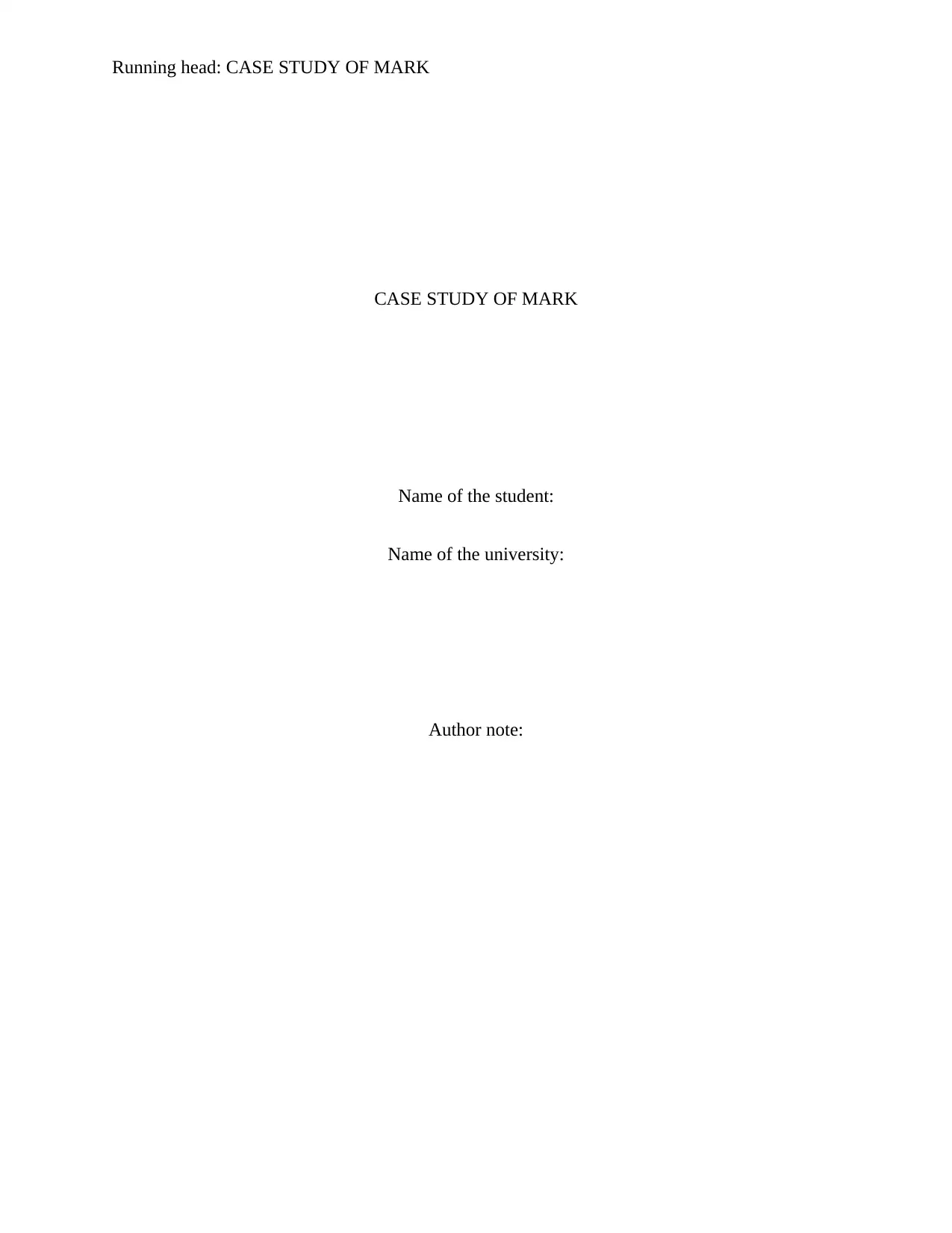
Running head: CASE STUDY OF MARK
CASE STUDY OF MARK
Name of the student:
Name of the university:
Author note:
CASE STUDY OF MARK
Name of the student:
Name of the university:
Author note:
Secure Best Marks with AI Grader
Need help grading? Try our AI Grader for instant feedback on your assignments.
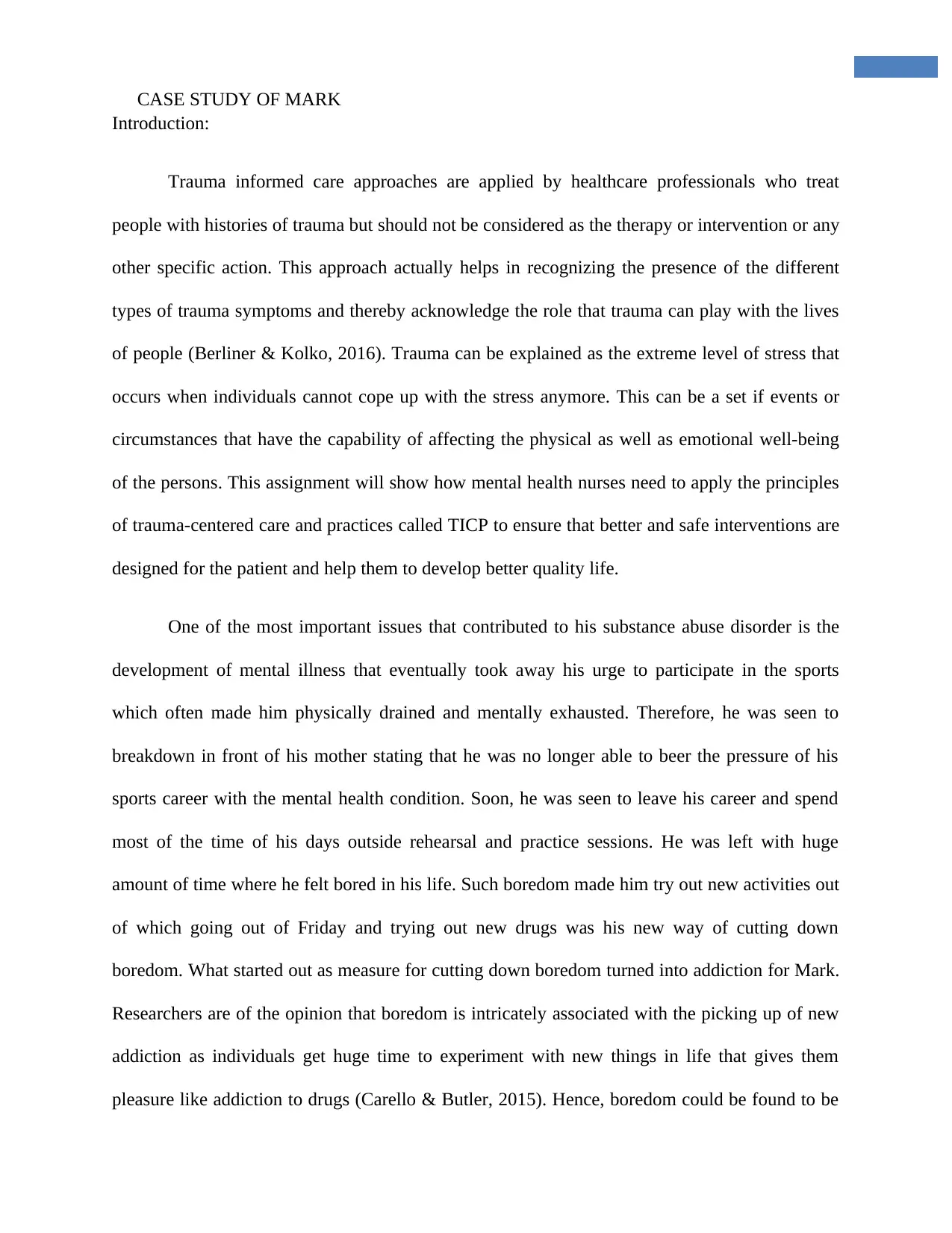
1
CASE STUDY OF MARK
Introduction:
Trauma informed care approaches are applied by healthcare professionals who treat
people with histories of trauma but should not be considered as the therapy or intervention or any
other specific action. This approach actually helps in recognizing the presence of the different
types of trauma symptoms and thereby acknowledge the role that trauma can play with the lives
of people (Berliner & Kolko, 2016). Trauma can be explained as the extreme level of stress that
occurs when individuals cannot cope up with the stress anymore. This can be a set if events or
circumstances that have the capability of affecting the physical as well as emotional well-being
of the persons. This assignment will show how mental health nurses need to apply the principles
of trauma-centered care and practices called TICP to ensure that better and safe interventions are
designed for the patient and help them to develop better quality life.
One of the most important issues that contributed to his substance abuse disorder is the
development of mental illness that eventually took away his urge to participate in the sports
which often made him physically drained and mentally exhausted. Therefore, he was seen to
breakdown in front of his mother stating that he was no longer able to beer the pressure of his
sports career with the mental health condition. Soon, he was seen to leave his career and spend
most of the time of his days outside rehearsal and practice sessions. He was left with huge
amount of time where he felt bored in his life. Such boredom made him try out new activities out
of which going out of Friday and trying out new drugs was his new way of cutting down
boredom. What started out as measure for cutting down boredom turned into addiction for Mark.
Researchers are of the opinion that boredom is intricately associated with the picking up of new
addiction as individuals get huge time to experiment with new things in life that gives them
pleasure like addiction to drugs (Carello & Butler, 2015). Hence, boredom could be found to be
CASE STUDY OF MARK
Introduction:
Trauma informed care approaches are applied by healthcare professionals who treat
people with histories of trauma but should not be considered as the therapy or intervention or any
other specific action. This approach actually helps in recognizing the presence of the different
types of trauma symptoms and thereby acknowledge the role that trauma can play with the lives
of people (Berliner & Kolko, 2016). Trauma can be explained as the extreme level of stress that
occurs when individuals cannot cope up with the stress anymore. This can be a set if events or
circumstances that have the capability of affecting the physical as well as emotional well-being
of the persons. This assignment will show how mental health nurses need to apply the principles
of trauma-centered care and practices called TICP to ensure that better and safe interventions are
designed for the patient and help them to develop better quality life.
One of the most important issues that contributed to his substance abuse disorder is the
development of mental illness that eventually took away his urge to participate in the sports
which often made him physically drained and mentally exhausted. Therefore, he was seen to
breakdown in front of his mother stating that he was no longer able to beer the pressure of his
sports career with the mental health condition. Soon, he was seen to leave his career and spend
most of the time of his days outside rehearsal and practice sessions. He was left with huge
amount of time where he felt bored in his life. Such boredom made him try out new activities out
of which going out of Friday and trying out new drugs was his new way of cutting down
boredom. What started out as measure for cutting down boredom turned into addiction for Mark.
Researchers are of the opinion that boredom is intricately associated with the picking up of new
addiction as individuals get huge time to experiment with new things in life that gives them
pleasure like addiction to drugs (Carello & Butler, 2015). Hence, boredom could be found to be
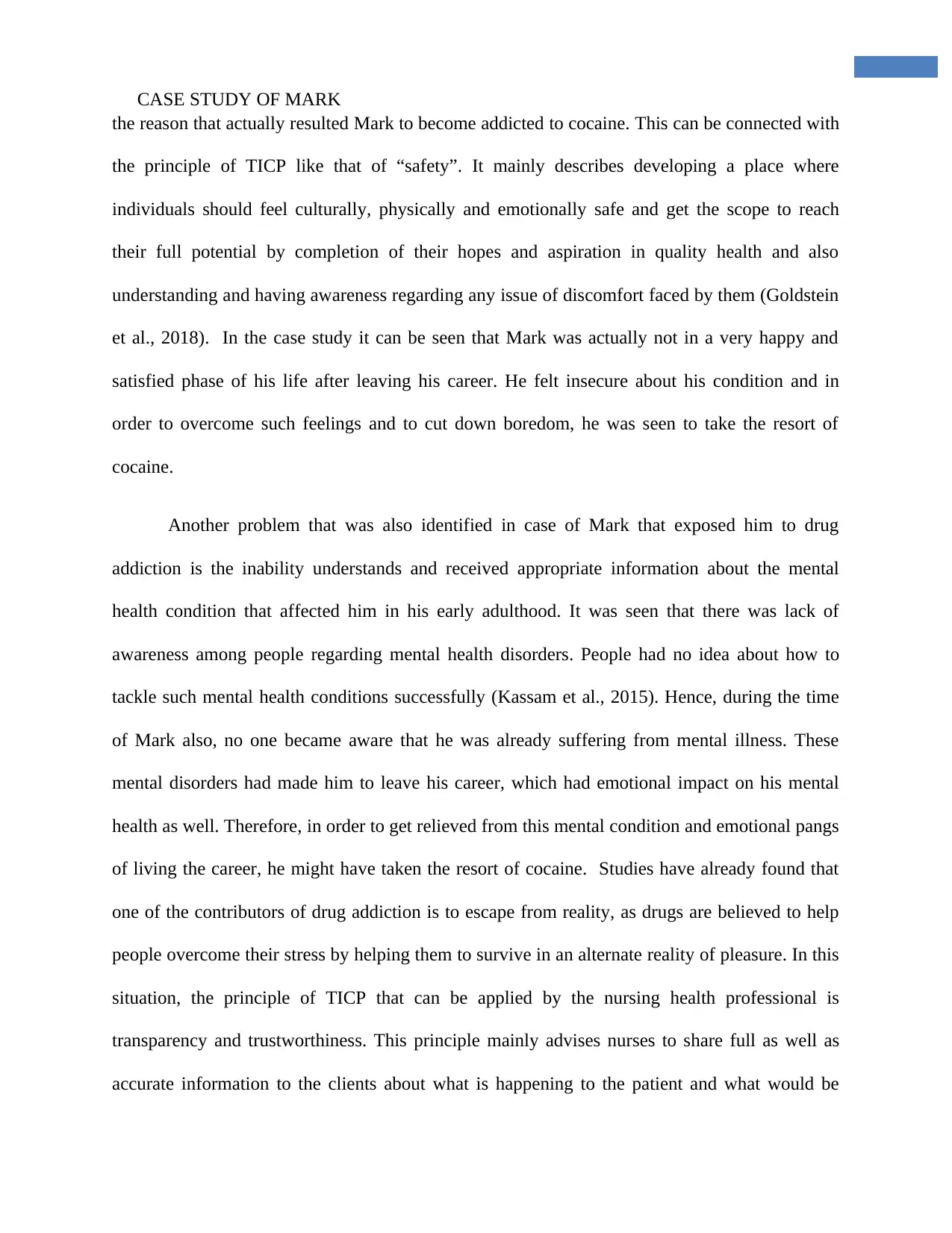
2
CASE STUDY OF MARK
the reason that actually resulted Mark to become addicted to cocaine. This can be connected with
the principle of TICP like that of “safety”. It mainly describes developing a place where
individuals should feel culturally, physically and emotionally safe and get the scope to reach
their full potential by completion of their hopes and aspiration in quality health and also
understanding and having awareness regarding any issue of discomfort faced by them (Goldstein
et al., 2018). In the case study it can be seen that Mark was actually not in a very happy and
satisfied phase of his life after leaving his career. He felt insecure about his condition and in
order to overcome such feelings and to cut down boredom, he was seen to take the resort of
cocaine.
Another problem that was also identified in case of Mark that exposed him to drug
addiction is the inability understands and received appropriate information about the mental
health condition that affected him in his early adulthood. It was seen that there was lack of
awareness among people regarding mental health disorders. People had no idea about how to
tackle such mental health conditions successfully (Kassam et al., 2015). Hence, during the time
of Mark also, no one became aware that he was already suffering from mental illness. These
mental disorders had made him to leave his career, which had emotional impact on his mental
health as well. Therefore, in order to get relieved from this mental condition and emotional pangs
of living the career, he might have taken the resort of cocaine. Studies have already found that
one of the contributors of drug addiction is to escape from reality, as drugs are believed to help
people overcome their stress by helping them to survive in an alternate reality of pleasure. In this
situation, the principle of TICP that can be applied by the nursing health professional is
transparency and trustworthiness. This principle mainly advises nurses to share full as well as
accurate information to the clients about what is happening to the patient and what would be
CASE STUDY OF MARK
the reason that actually resulted Mark to become addicted to cocaine. This can be connected with
the principle of TICP like that of “safety”. It mainly describes developing a place where
individuals should feel culturally, physically and emotionally safe and get the scope to reach
their full potential by completion of their hopes and aspiration in quality health and also
understanding and having awareness regarding any issue of discomfort faced by them (Goldstein
et al., 2018). In the case study it can be seen that Mark was actually not in a very happy and
satisfied phase of his life after leaving his career. He felt insecure about his condition and in
order to overcome such feelings and to cut down boredom, he was seen to take the resort of
cocaine.
Another problem that was also identified in case of Mark that exposed him to drug
addiction is the inability understands and received appropriate information about the mental
health condition that affected him in his early adulthood. It was seen that there was lack of
awareness among people regarding mental health disorders. People had no idea about how to
tackle such mental health conditions successfully (Kassam et al., 2015). Hence, during the time
of Mark also, no one became aware that he was already suffering from mental illness. These
mental disorders had made him to leave his career, which had emotional impact on his mental
health as well. Therefore, in order to get relieved from this mental condition and emotional pangs
of living the career, he might have taken the resort of cocaine. Studies have already found that
one of the contributors of drug addiction is to escape from reality, as drugs are believed to help
people overcome their stress by helping them to survive in an alternate reality of pleasure. In this
situation, the principle of TICP that can be applied by the nursing health professional is
transparency and trustworthiness. This principle mainly advises nurses to share full as well as
accurate information to the clients about what is happening to the patient and what would be
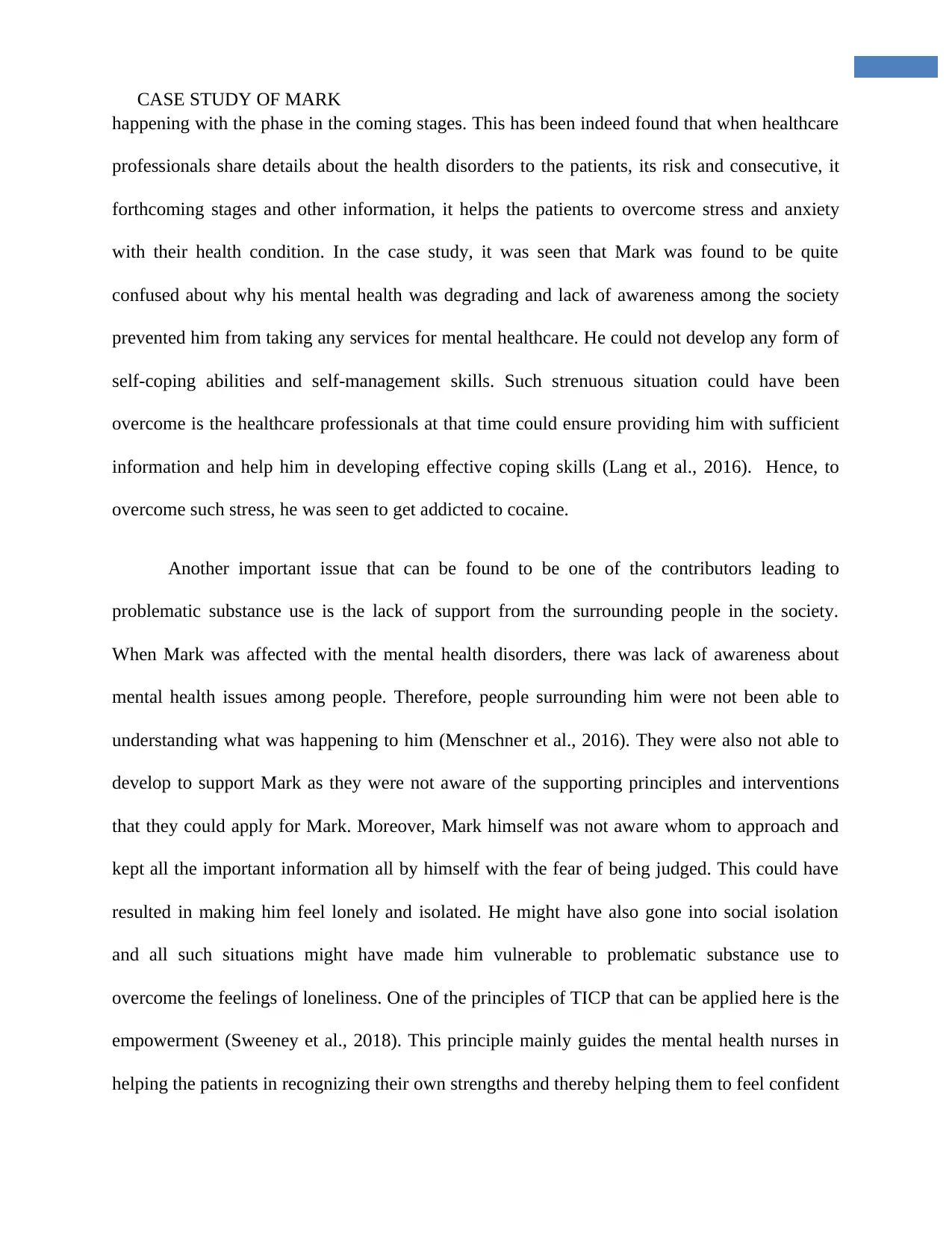
3
CASE STUDY OF MARK
happening with the phase in the coming stages. This has been indeed found that when healthcare
professionals share details about the health disorders to the patients, its risk and consecutive, it
forthcoming stages and other information, it helps the patients to overcome stress and anxiety
with their health condition. In the case study, it was seen that Mark was found to be quite
confused about why his mental health was degrading and lack of awareness among the society
prevented him from taking any services for mental healthcare. He could not develop any form of
self-coping abilities and self-management skills. Such strenuous situation could have been
overcome is the healthcare professionals at that time could ensure providing him with sufficient
information and help him in developing effective coping skills (Lang et al., 2016). Hence, to
overcome such stress, he was seen to get addicted to cocaine.
Another important issue that can be found to be one of the contributors leading to
problematic substance use is the lack of support from the surrounding people in the society.
When Mark was affected with the mental health disorders, there was lack of awareness about
mental health issues among people. Therefore, people surrounding him were not been able to
understanding what was happening to him (Menschner et al., 2016). They were also not able to
develop to support Mark as they were not aware of the supporting principles and interventions
that they could apply for Mark. Moreover, Mark himself was not aware whom to approach and
kept all the important information all by himself with the fear of being judged. This could have
resulted in making him feel lonely and isolated. He might have also gone into social isolation
and all such situations might have made him vulnerable to problematic substance use to
overcome the feelings of loneliness. One of the principles of TICP that can be applied here is the
empowerment (Sweeney et al., 2018). This principle mainly guides the mental health nurses in
helping the patients in recognizing their own strengths and thereby helping them to feel confident
CASE STUDY OF MARK
happening with the phase in the coming stages. This has been indeed found that when healthcare
professionals share details about the health disorders to the patients, its risk and consecutive, it
forthcoming stages and other information, it helps the patients to overcome stress and anxiety
with their health condition. In the case study, it was seen that Mark was found to be quite
confused about why his mental health was degrading and lack of awareness among the society
prevented him from taking any services for mental healthcare. He could not develop any form of
self-coping abilities and self-management skills. Such strenuous situation could have been
overcome is the healthcare professionals at that time could ensure providing him with sufficient
information and help him in developing effective coping skills (Lang et al., 2016). Hence, to
overcome such stress, he was seen to get addicted to cocaine.
Another important issue that can be found to be one of the contributors leading to
problematic substance use is the lack of support from the surrounding people in the society.
When Mark was affected with the mental health disorders, there was lack of awareness about
mental health issues among people. Therefore, people surrounding him were not been able to
understanding what was happening to him (Menschner et al., 2016). They were also not able to
develop to support Mark as they were not aware of the supporting principles and interventions
that they could apply for Mark. Moreover, Mark himself was not aware whom to approach and
kept all the important information all by himself with the fear of being judged. This could have
resulted in making him feel lonely and isolated. He might have also gone into social isolation
and all such situations might have made him vulnerable to problematic substance use to
overcome the feelings of loneliness. One of the principles of TICP that can be applied here is the
empowerment (Sweeney et al., 2018). This principle mainly guides the mental health nurses in
helping the patients in recognizing their own strengths and thereby helping them to feel confident
Secure Best Marks with AI Grader
Need help grading? Try our AI Grader for instant feedback on your assignments.
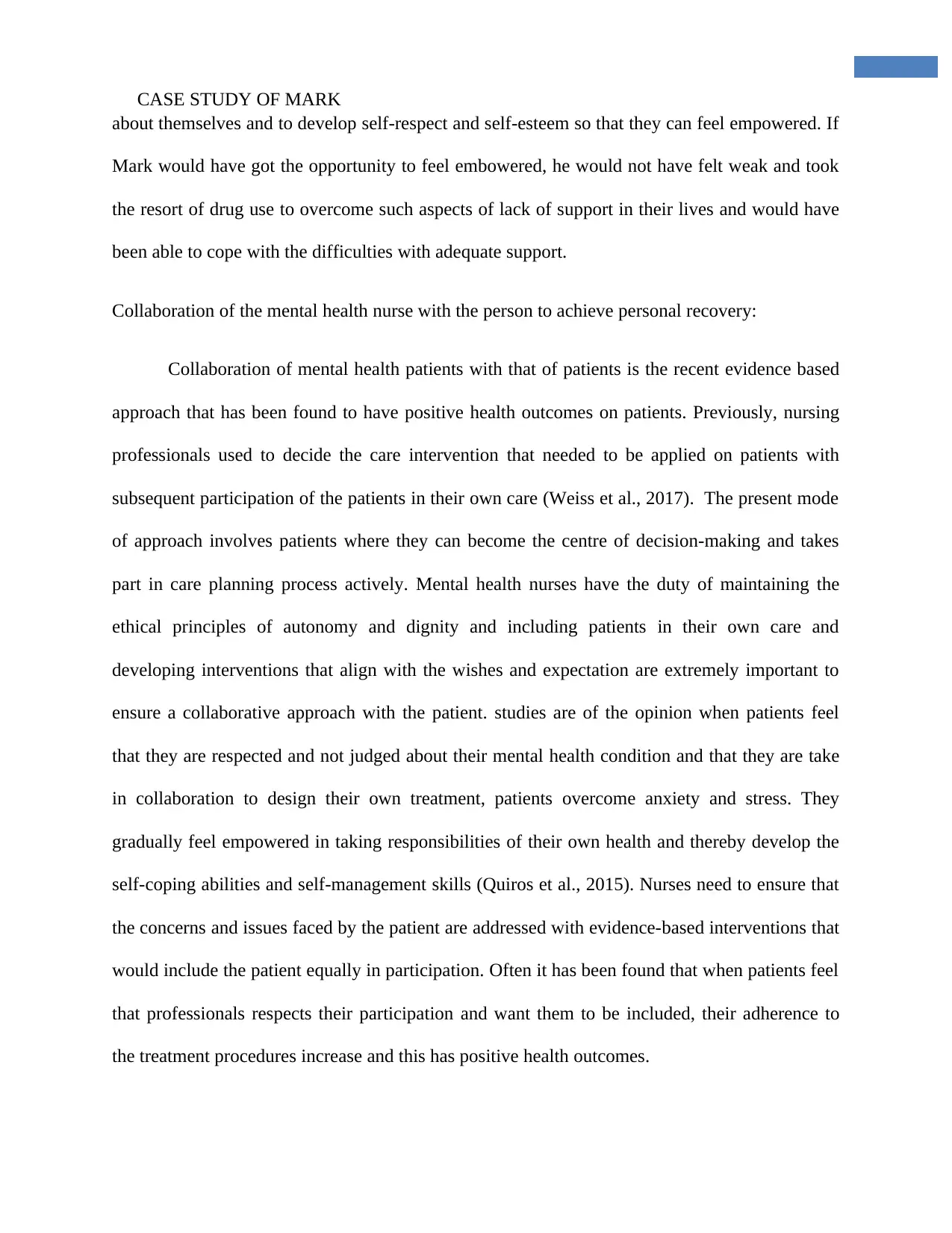
4
CASE STUDY OF MARK
about themselves and to develop self-respect and self-esteem so that they can feel empowered. If
Mark would have got the opportunity to feel embowered, he would not have felt weak and took
the resort of drug use to overcome such aspects of lack of support in their lives and would have
been able to cope with the difficulties with adequate support.
Collaboration of the mental health nurse with the person to achieve personal recovery:
Collaboration of mental health patients with that of patients is the recent evidence based
approach that has been found to have positive health outcomes on patients. Previously, nursing
professionals used to decide the care intervention that needed to be applied on patients with
subsequent participation of the patients in their own care (Weiss et al., 2017). The present mode
of approach involves patients where they can become the centre of decision-making and takes
part in care planning process actively. Mental health nurses have the duty of maintaining the
ethical principles of autonomy and dignity and including patients in their own care and
developing interventions that align with the wishes and expectation are extremely important to
ensure a collaborative approach with the patient. studies are of the opinion when patients feel
that they are respected and not judged about their mental health condition and that they are take
in collaboration to design their own treatment, patients overcome anxiety and stress. They
gradually feel empowered in taking responsibilities of their own health and thereby develop the
self-coping abilities and self-management skills (Quiros et al., 2015). Nurses need to ensure that
the concerns and issues faced by the patient are addressed with evidence-based interventions that
would include the patient equally in participation. Often it has been found that when patients feel
that professionals respects their participation and want them to be included, their adherence to
the treatment procedures increase and this has positive health outcomes.
CASE STUDY OF MARK
about themselves and to develop self-respect and self-esteem so that they can feel empowered. If
Mark would have got the opportunity to feel embowered, he would not have felt weak and took
the resort of drug use to overcome such aspects of lack of support in their lives and would have
been able to cope with the difficulties with adequate support.
Collaboration of the mental health nurse with the person to achieve personal recovery:
Collaboration of mental health patients with that of patients is the recent evidence based
approach that has been found to have positive health outcomes on patients. Previously, nursing
professionals used to decide the care intervention that needed to be applied on patients with
subsequent participation of the patients in their own care (Weiss et al., 2017). The present mode
of approach involves patients where they can become the centre of decision-making and takes
part in care planning process actively. Mental health nurses have the duty of maintaining the
ethical principles of autonomy and dignity and including patients in their own care and
developing interventions that align with the wishes and expectation are extremely important to
ensure a collaborative approach with the patient. studies are of the opinion when patients feel
that they are respected and not judged about their mental health condition and that they are take
in collaboration to design their own treatment, patients overcome anxiety and stress. They
gradually feel empowered in taking responsibilities of their own health and thereby develop the
self-coping abilities and self-management skills (Quiros et al., 2015). Nurses need to ensure that
the concerns and issues faced by the patient are addressed with evidence-based interventions that
would include the patient equally in participation. Often it has been found that when patients feel
that professionals respects their participation and want them to be included, their adherence to
the treatment procedures increase and this has positive health outcomes.
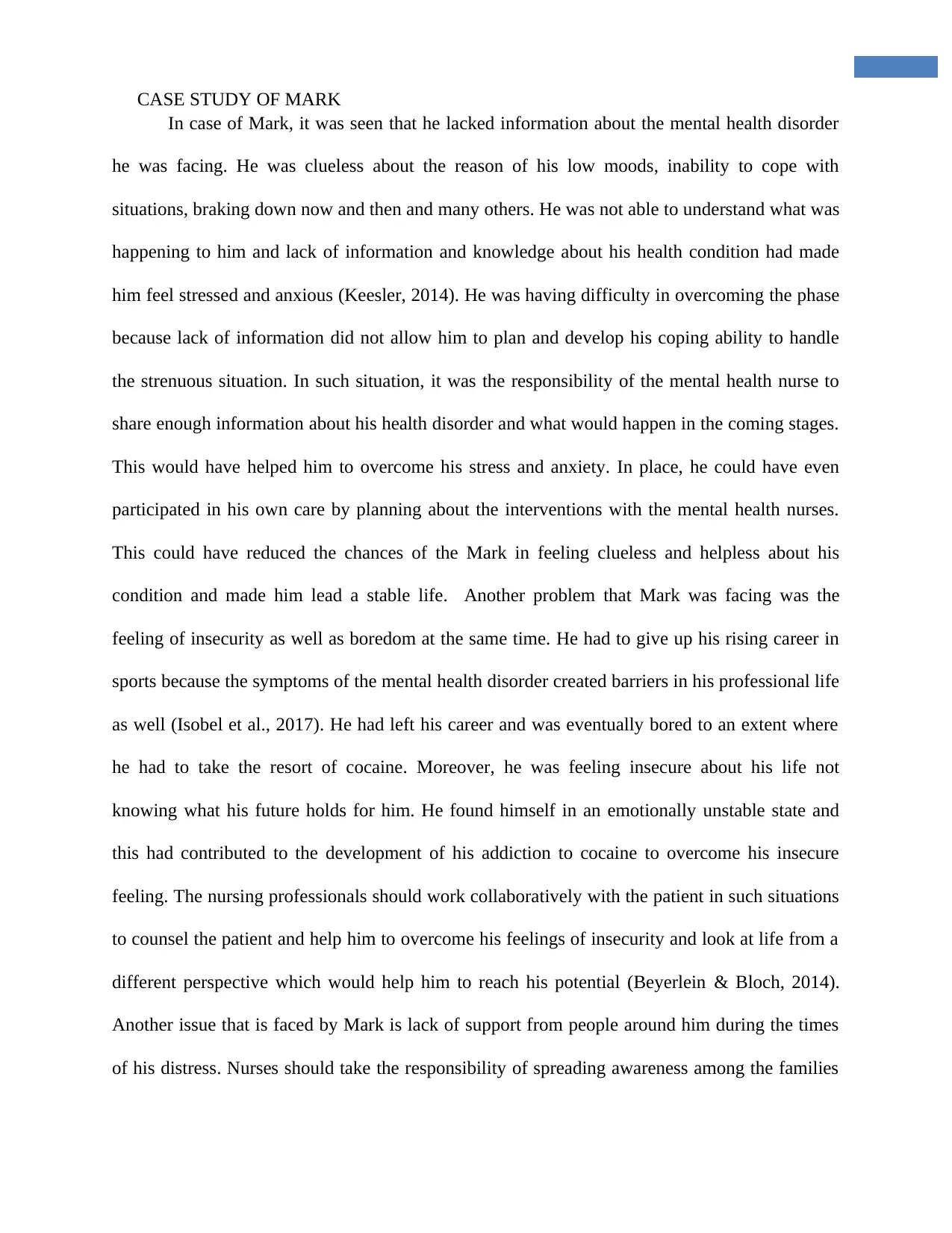
5
CASE STUDY OF MARK
In case of Mark, it was seen that he lacked information about the mental health disorder
he was facing. He was clueless about the reason of his low moods, inability to cope with
situations, braking down now and then and many others. He was not able to understand what was
happening to him and lack of information and knowledge about his health condition had made
him feel stressed and anxious (Keesler, 2014). He was having difficulty in overcoming the phase
because lack of information did not allow him to plan and develop his coping ability to handle
the strenuous situation. In such situation, it was the responsibility of the mental health nurse to
share enough information about his health disorder and what would happen in the coming stages.
This would have helped him to overcome his stress and anxiety. In place, he could have even
participated in his own care by planning about the interventions with the mental health nurses.
This could have reduced the chances of the Mark in feeling clueless and helpless about his
condition and made him lead a stable life. Another problem that Mark was facing was the
feeling of insecurity as well as boredom at the same time. He had to give up his rising career in
sports because the symptoms of the mental health disorder created barriers in his professional life
as well (Isobel et al., 2017). He had left his career and was eventually bored to an extent where
he had to take the resort of cocaine. Moreover, he was feeling insecure about his life not
knowing what his future holds for him. He found himself in an emotionally unstable state and
this had contributed to the development of his addiction to cocaine to overcome his insecure
feeling. The nursing professionals should work collaboratively with the patient in such situations
to counsel the patient and help him to overcome his feelings of insecurity and look at life from a
different perspective which would help him to reach his potential (Beyerlein & Bloch, 2014).
Another issue that is faced by Mark is lack of support from people around him during the times
of his distress. Nurses should take the responsibility of spreading awareness among the families
CASE STUDY OF MARK
In case of Mark, it was seen that he lacked information about the mental health disorder
he was facing. He was clueless about the reason of his low moods, inability to cope with
situations, braking down now and then and many others. He was not able to understand what was
happening to him and lack of information and knowledge about his health condition had made
him feel stressed and anxious (Keesler, 2014). He was having difficulty in overcoming the phase
because lack of information did not allow him to plan and develop his coping ability to handle
the strenuous situation. In such situation, it was the responsibility of the mental health nurse to
share enough information about his health disorder and what would happen in the coming stages.
This would have helped him to overcome his stress and anxiety. In place, he could have even
participated in his own care by planning about the interventions with the mental health nurses.
This could have reduced the chances of the Mark in feeling clueless and helpless about his
condition and made him lead a stable life. Another problem that Mark was facing was the
feeling of insecurity as well as boredom at the same time. He had to give up his rising career in
sports because the symptoms of the mental health disorder created barriers in his professional life
as well (Isobel et al., 2017). He had left his career and was eventually bored to an extent where
he had to take the resort of cocaine. Moreover, he was feeling insecure about his life not
knowing what his future holds for him. He found himself in an emotionally unstable state and
this had contributed to the development of his addiction to cocaine to overcome his insecure
feeling. The nursing professionals should work collaboratively with the patient in such situations
to counsel the patient and help him to overcome his feelings of insecurity and look at life from a
different perspective which would help him to reach his potential (Beyerlein & Bloch, 2014).
Another issue that is faced by Mark is lack of support from people around him during the times
of his distress. Nurses should take the responsibility of spreading awareness among the families
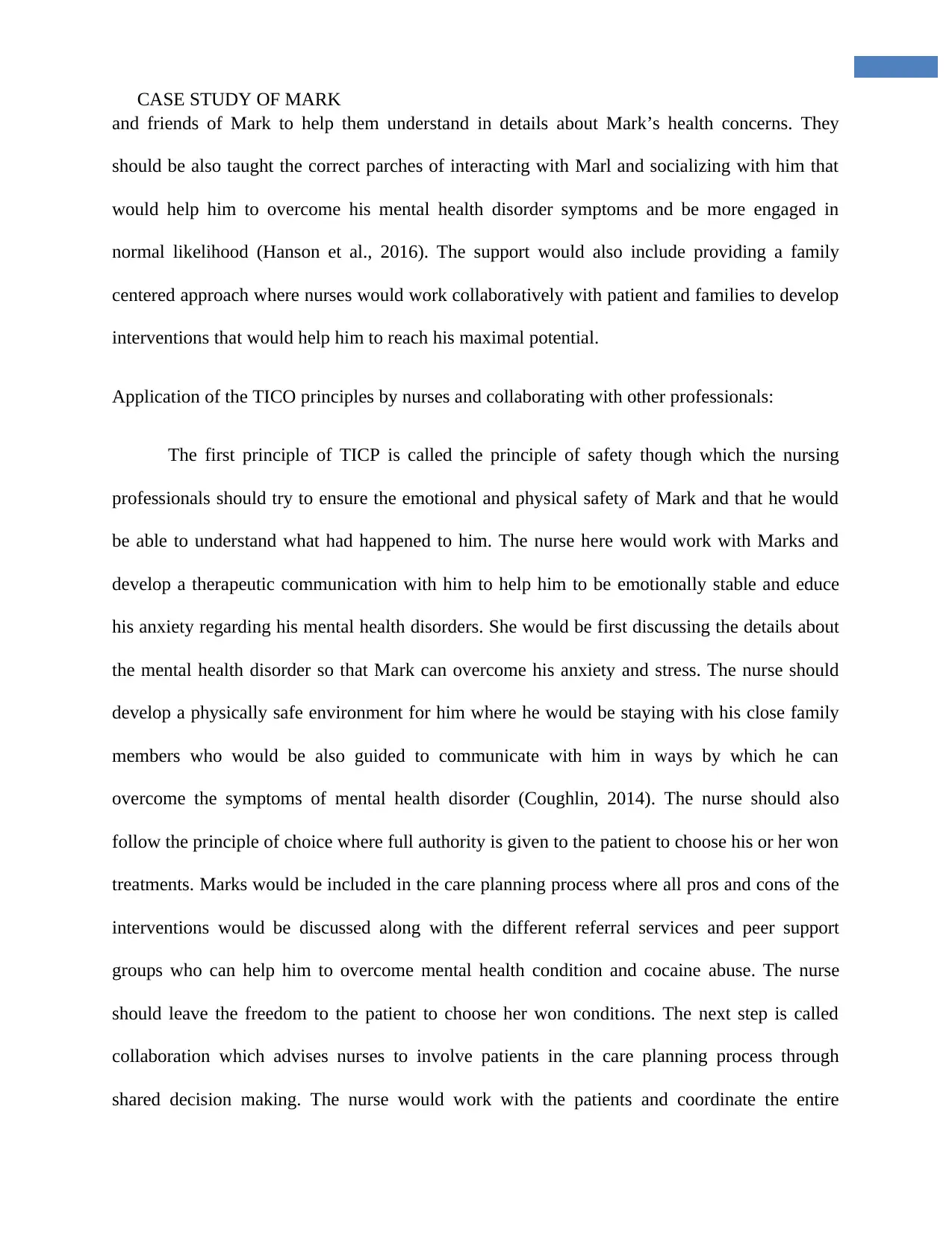
6
CASE STUDY OF MARK
and friends of Mark to help them understand in details about Mark’s health concerns. They
should be also taught the correct parches of interacting with Marl and socializing with him that
would help him to overcome his mental health disorder symptoms and be more engaged in
normal likelihood (Hanson et al., 2016). The support would also include providing a family
centered approach where nurses would work collaboratively with patient and families to develop
interventions that would help him to reach his maximal potential.
Application of the TICO principles by nurses and collaborating with other professionals:
The first principle of TICP is called the principle of safety though which the nursing
professionals should try to ensure the emotional and physical safety of Mark and that he would
be able to understand what had happened to him. The nurse here would work with Marks and
develop a therapeutic communication with him to help him to be emotionally stable and educe
his anxiety regarding his mental health disorders. She would be first discussing the details about
the mental health disorder so that Mark can overcome his anxiety and stress. The nurse should
develop a physically safe environment for him where he would be staying with his close family
members who would be also guided to communicate with him in ways by which he can
overcome the symptoms of mental health disorder (Coughlin, 2014). The nurse should also
follow the principle of choice where full authority is given to the patient to choose his or her won
treatments. Marks would be included in the care planning process where all pros and cons of the
interventions would be discussed along with the different referral services and peer support
groups who can help him to overcome mental health condition and cocaine abuse. The nurse
should leave the freedom to the patient to choose her won conditions. The next step is called
collaboration which advises nurses to involve patients in the care planning process through
shared decision making. The nurse would work with the patients and coordinate the entire
CASE STUDY OF MARK
and friends of Mark to help them understand in details about Mark’s health concerns. They
should be also taught the correct parches of interacting with Marl and socializing with him that
would help him to overcome his mental health disorder symptoms and be more engaged in
normal likelihood (Hanson et al., 2016). The support would also include providing a family
centered approach where nurses would work collaboratively with patient and families to develop
interventions that would help him to reach his maximal potential.
Application of the TICO principles by nurses and collaborating with other professionals:
The first principle of TICP is called the principle of safety though which the nursing
professionals should try to ensure the emotional and physical safety of Mark and that he would
be able to understand what had happened to him. The nurse here would work with Marks and
develop a therapeutic communication with him to help him to be emotionally stable and educe
his anxiety regarding his mental health disorders. She would be first discussing the details about
the mental health disorder so that Mark can overcome his anxiety and stress. The nurse should
develop a physically safe environment for him where he would be staying with his close family
members who would be also guided to communicate with him in ways by which he can
overcome the symptoms of mental health disorder (Coughlin, 2014). The nurse should also
follow the principle of choice where full authority is given to the patient to choose his or her won
treatments. Marks would be included in the care planning process where all pros and cons of the
interventions would be discussed along with the different referral services and peer support
groups who can help him to overcome mental health condition and cocaine abuse. The nurse
should leave the freedom to the patient to choose her won conditions. The next step is called
collaboration which advises nurses to involve patients in the care planning process through
shared decision making. The nurse would work with the patients and coordinate the entire
Paraphrase This Document
Need a fresh take? Get an instant paraphrase of this document with our AI Paraphraser
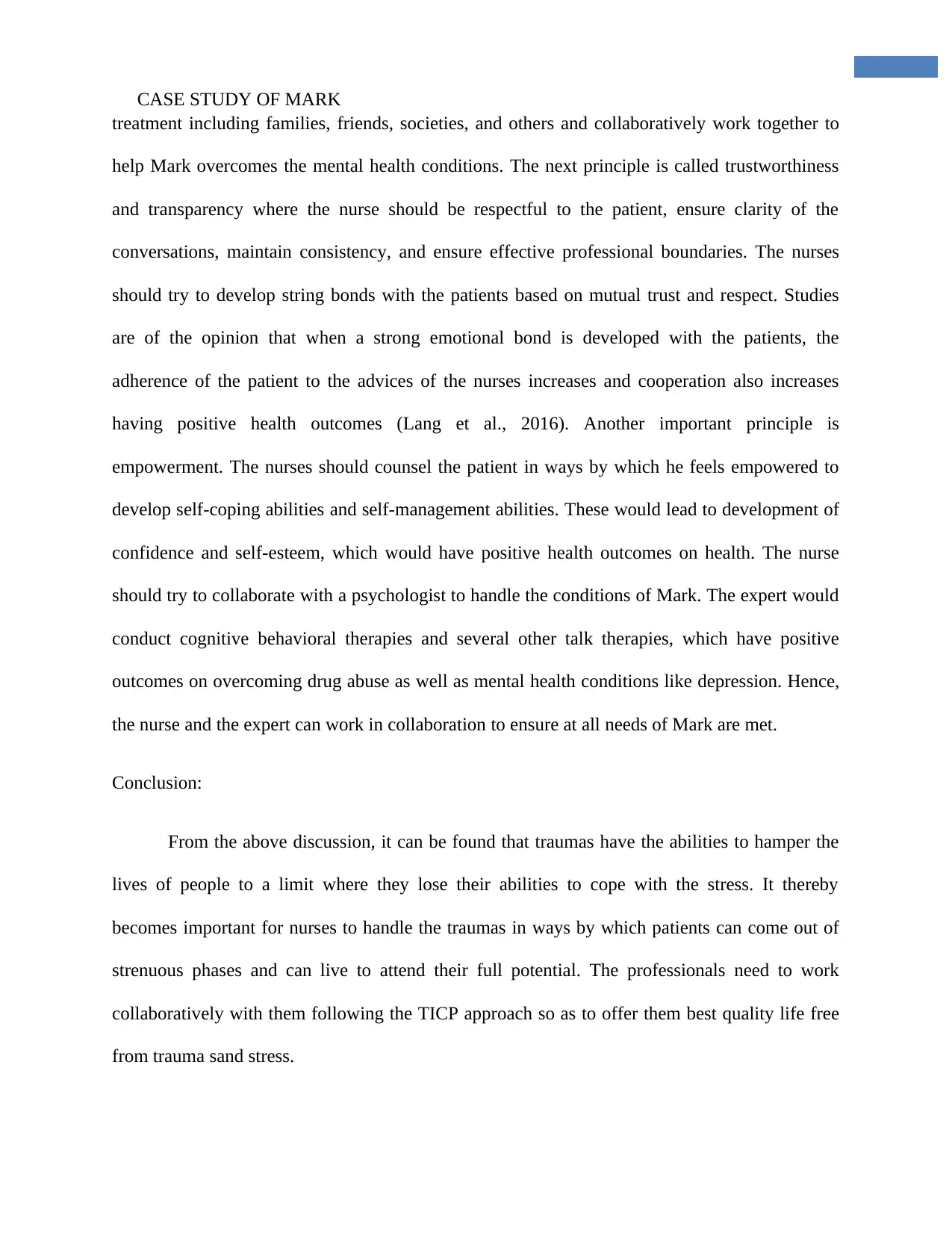
7
CASE STUDY OF MARK
treatment including families, friends, societies, and others and collaboratively work together to
help Mark overcomes the mental health conditions. The next principle is called trustworthiness
and transparency where the nurse should be respectful to the patient, ensure clarity of the
conversations, maintain consistency, and ensure effective professional boundaries. The nurses
should try to develop string bonds with the patients based on mutual trust and respect. Studies
are of the opinion that when a strong emotional bond is developed with the patients, the
adherence of the patient to the advices of the nurses increases and cooperation also increases
having positive health outcomes (Lang et al., 2016). Another important principle is
empowerment. The nurses should counsel the patient in ways by which he feels empowered to
develop self-coping abilities and self-management abilities. These would lead to development of
confidence and self-esteem, which would have positive health outcomes on health. The nurse
should try to collaborate with a psychologist to handle the conditions of Mark. The expert would
conduct cognitive behavioral therapies and several other talk therapies, which have positive
outcomes on overcoming drug abuse as well as mental health conditions like depression. Hence,
the nurse and the expert can work in collaboration to ensure at all needs of Mark are met.
Conclusion:
From the above discussion, it can be found that traumas have the abilities to hamper the
lives of people to a limit where they lose their abilities to cope with the stress. It thereby
becomes important for nurses to handle the traumas in ways by which patients can come out of
strenuous phases and can live to attend their full potential. The professionals need to work
collaboratively with them following the TICP approach so as to offer them best quality life free
from trauma sand stress.
CASE STUDY OF MARK
treatment including families, friends, societies, and others and collaboratively work together to
help Mark overcomes the mental health conditions. The next principle is called trustworthiness
and transparency where the nurse should be respectful to the patient, ensure clarity of the
conversations, maintain consistency, and ensure effective professional boundaries. The nurses
should try to develop string bonds with the patients based on mutual trust and respect. Studies
are of the opinion that when a strong emotional bond is developed with the patients, the
adherence of the patient to the advices of the nurses increases and cooperation also increases
having positive health outcomes (Lang et al., 2016). Another important principle is
empowerment. The nurses should counsel the patient in ways by which he feels empowered to
develop self-coping abilities and self-management abilities. These would lead to development of
confidence and self-esteem, which would have positive health outcomes on health. The nurse
should try to collaborate with a psychologist to handle the conditions of Mark. The expert would
conduct cognitive behavioral therapies and several other talk therapies, which have positive
outcomes on overcoming drug abuse as well as mental health conditions like depression. Hence,
the nurse and the expert can work in collaboration to ensure at all needs of Mark are met.
Conclusion:
From the above discussion, it can be found that traumas have the abilities to hamper the
lives of people to a limit where they lose their abilities to cope with the stress. It thereby
becomes important for nurses to handle the traumas in ways by which patients can come out of
strenuous phases and can live to attend their full potential. The professionals need to work
collaboratively with them following the TICP approach so as to offer them best quality life free
from trauma sand stress.
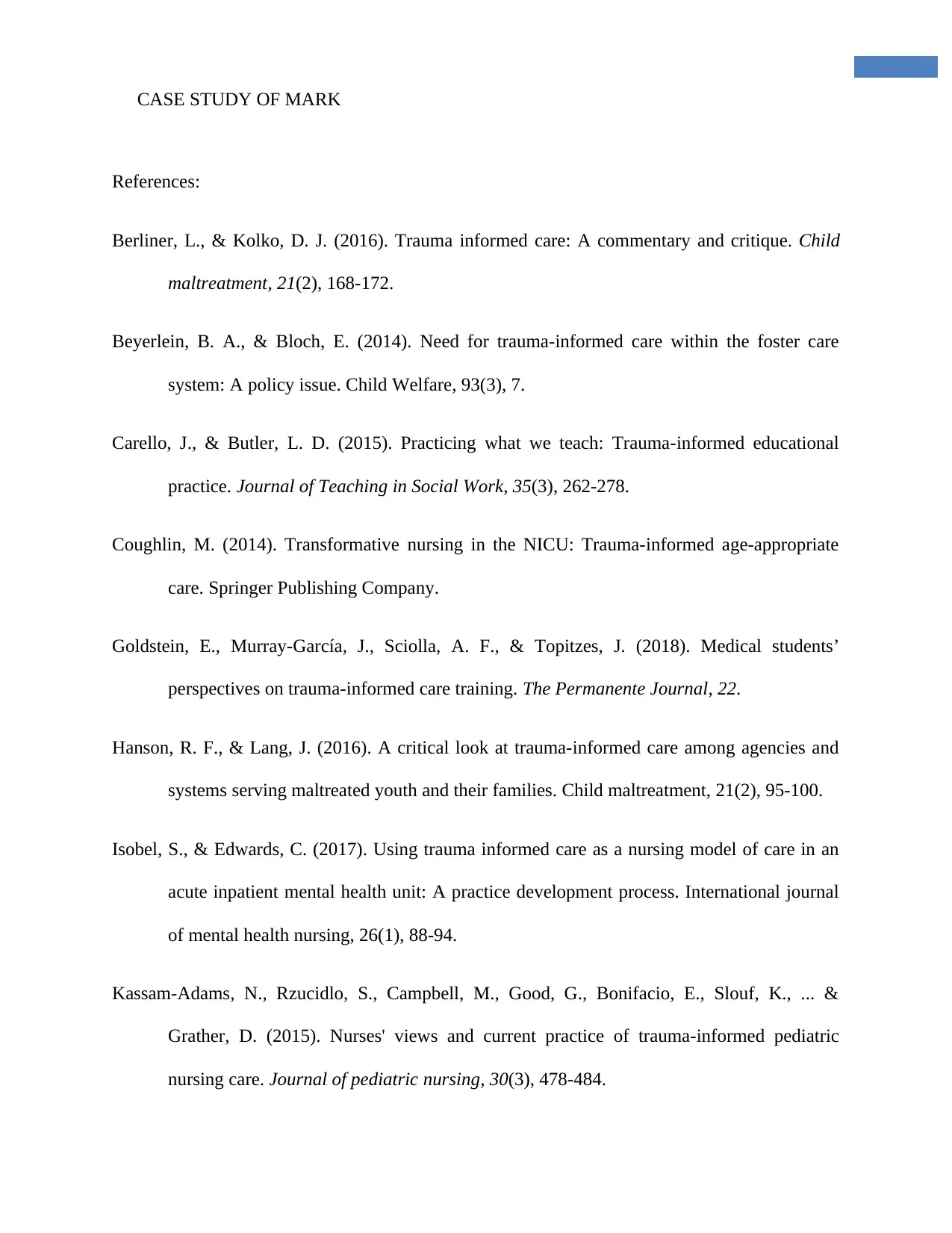
8
CASE STUDY OF MARK
References:
Berliner, L., & Kolko, D. J. (2016). Trauma informed care: A commentary and critique. Child
maltreatment, 21(2), 168-172.
Beyerlein, B. A., & Bloch, E. (2014). Need for trauma-informed care within the foster care
system: A policy issue. Child Welfare, 93(3), 7.
Carello, J., & Butler, L. D. (2015). Practicing what we teach: Trauma-informed educational
practice. Journal of Teaching in Social Work, 35(3), 262-278.
Coughlin, M. (2014). Transformative nursing in the NICU: Trauma-informed age-appropriate
care. Springer Publishing Company.
Goldstein, E., Murray-García, J., Sciolla, A. F., & Topitzes, J. (2018). Medical students’
perspectives on trauma-informed care training. The Permanente Journal, 22.
Hanson, R. F., & Lang, J. (2016). A critical look at trauma-informed care among agencies and
systems serving maltreated youth and their families. Child maltreatment, 21(2), 95-100.
Isobel, S., & Edwards, C. (2017). Using trauma informed care as a nursing model of care in an
acute inpatient mental health unit: A practice development process. International journal
of mental health nursing, 26(1), 88-94.
Kassam-Adams, N., Rzucidlo, S., Campbell, M., Good, G., Bonifacio, E., Slouf, K., ... &
Grather, D. (2015). Nurses' views and current practice of trauma-informed pediatric
nursing care. Journal of pediatric nursing, 30(3), 478-484.
CASE STUDY OF MARK
References:
Berliner, L., & Kolko, D. J. (2016). Trauma informed care: A commentary and critique. Child
maltreatment, 21(2), 168-172.
Beyerlein, B. A., & Bloch, E. (2014). Need for trauma-informed care within the foster care
system: A policy issue. Child Welfare, 93(3), 7.
Carello, J., & Butler, L. D. (2015). Practicing what we teach: Trauma-informed educational
practice. Journal of Teaching in Social Work, 35(3), 262-278.
Coughlin, M. (2014). Transformative nursing in the NICU: Trauma-informed age-appropriate
care. Springer Publishing Company.
Goldstein, E., Murray-García, J., Sciolla, A. F., & Topitzes, J. (2018). Medical students’
perspectives on trauma-informed care training. The Permanente Journal, 22.
Hanson, R. F., & Lang, J. (2016). A critical look at trauma-informed care among agencies and
systems serving maltreated youth and their families. Child maltreatment, 21(2), 95-100.
Isobel, S., & Edwards, C. (2017). Using trauma informed care as a nursing model of care in an
acute inpatient mental health unit: A practice development process. International journal
of mental health nursing, 26(1), 88-94.
Kassam-Adams, N., Rzucidlo, S., Campbell, M., Good, G., Bonifacio, E., Slouf, K., ... &
Grather, D. (2015). Nurses' views and current practice of trauma-informed pediatric
nursing care. Journal of pediatric nursing, 30(3), 478-484.
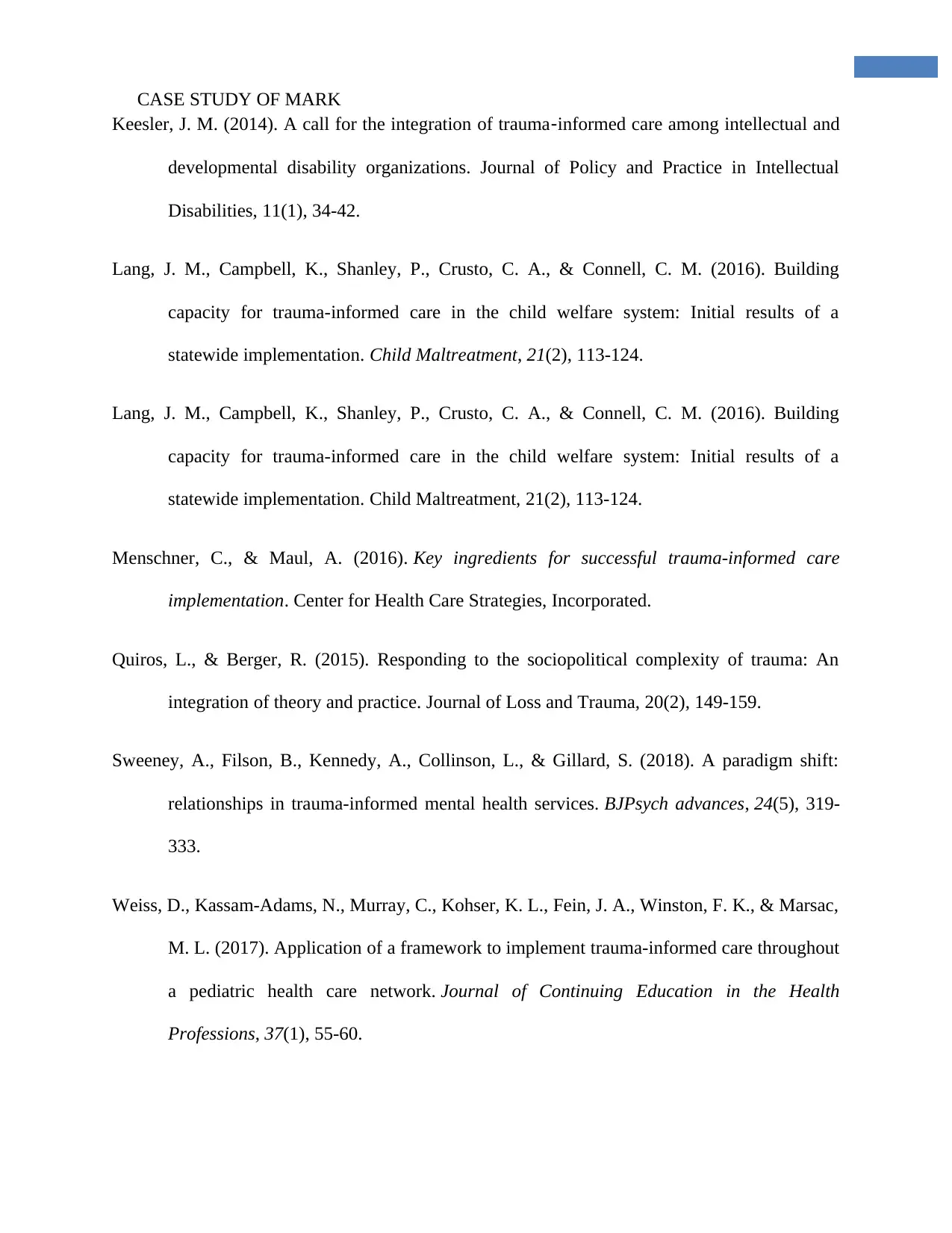
9
CASE STUDY OF MARK
Keesler, J. M. (2014). A call for the integration of trauma‐informed care among intellectual and
developmental disability organizations. Journal of Policy and Practice in Intellectual
Disabilities, 11(1), 34-42.
Lang, J. M., Campbell, K., Shanley, P., Crusto, C. A., & Connell, C. M. (2016). Building
capacity for trauma-informed care in the child welfare system: Initial results of a
statewide implementation. Child Maltreatment, 21(2), 113-124.
Lang, J. M., Campbell, K., Shanley, P., Crusto, C. A., & Connell, C. M. (2016). Building
capacity for trauma-informed care in the child welfare system: Initial results of a
statewide implementation. Child Maltreatment, 21(2), 113-124.
Menschner, C., & Maul, A. (2016). Key ingredients for successful trauma-informed care
implementation. Center for Health Care Strategies, Incorporated.
Quiros, L., & Berger, R. (2015). Responding to the sociopolitical complexity of trauma: An
integration of theory and practice. Journal of Loss and Trauma, 20(2), 149-159.
Sweeney, A., Filson, B., Kennedy, A., Collinson, L., & Gillard, S. (2018). A paradigm shift:
relationships in trauma-informed mental health services. BJPsych advances, 24(5), 319-
333.
Weiss, D., Kassam-Adams, N., Murray, C., Kohser, K. L., Fein, J. A., Winston, F. K., & Marsac,
M. L. (2017). Application of a framework to implement trauma-informed care throughout
a pediatric health care network. Journal of Continuing Education in the Health
Professions, 37(1), 55-60.
CASE STUDY OF MARK
Keesler, J. M. (2014). A call for the integration of trauma‐informed care among intellectual and
developmental disability organizations. Journal of Policy and Practice in Intellectual
Disabilities, 11(1), 34-42.
Lang, J. M., Campbell, K., Shanley, P., Crusto, C. A., & Connell, C. M. (2016). Building
capacity for trauma-informed care in the child welfare system: Initial results of a
statewide implementation. Child Maltreatment, 21(2), 113-124.
Lang, J. M., Campbell, K., Shanley, P., Crusto, C. A., & Connell, C. M. (2016). Building
capacity for trauma-informed care in the child welfare system: Initial results of a
statewide implementation. Child Maltreatment, 21(2), 113-124.
Menschner, C., & Maul, A. (2016). Key ingredients for successful trauma-informed care
implementation. Center for Health Care Strategies, Incorporated.
Quiros, L., & Berger, R. (2015). Responding to the sociopolitical complexity of trauma: An
integration of theory and practice. Journal of Loss and Trauma, 20(2), 149-159.
Sweeney, A., Filson, B., Kennedy, A., Collinson, L., & Gillard, S. (2018). A paradigm shift:
relationships in trauma-informed mental health services. BJPsych advances, 24(5), 319-
333.
Weiss, D., Kassam-Adams, N., Murray, C., Kohser, K. L., Fein, J. A., Winston, F. K., & Marsac,
M. L. (2017). Application of a framework to implement trauma-informed care throughout
a pediatric health care network. Journal of Continuing Education in the Health
Professions, 37(1), 55-60.
1 out of 10
Related Documents
Your All-in-One AI-Powered Toolkit for Academic Success.
+13062052269
info@desklib.com
Available 24*7 on WhatsApp / Email
![[object Object]](/_next/static/media/star-bottom.7253800d.svg)
Unlock your academic potential
© 2024 | Zucol Services PVT LTD | All rights reserved.





